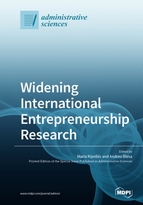Widening International Entrepreneurship Research
A special issue of Administrative Sciences (ISSN 2076-3387). This special issue belongs to the section "International Entrepreneurship".
Deadline for manuscript submissions: closed (15 June 2019) | Viewed by 51551
Special Issue Editors
Interests: strategic management; entrepreneurship; marketing; international marketing; entrepreneurial skills
Special Issue Information
Dear Colleagues,
International Entrepreneurship (IE) has become a topic that has attracted the attention of many scholars, from fields and disciplines that have an interest in understanding factors that drive firms’ early internationalization and growth. The IE field has become more prominent since the seminal paper by Oviatt and McDougall (1994), entitled “Toward a theory of international new ventures”. Consistent with the early phases of research on new phenomena, most IE research has been exploratory and descriptive, with little emphasis on developing theory. However, over the last two decades, research has employed more robust theoretical frameworks and the field has become firmly established. In consequence, several factors have been identified as having a high explanatory power (Servantie et al. 2016) at different levels. For example, the speed of internationalization has been associated with the possession of proprietary products, knowledge-intensive products, high-technology products, high-value products, and high-quality products (Gabrielsson et al. 2008). Researchers have also agreed that key orientations and capabilities associated with the speed of internationalization include learning orientation, entrepreneurial orientation, market orientation, commitment to IB, a general global orientation, and relational and dynamic capabilities (Knight and Liesch 2016). Additionally, social networks, collaborative agreements, and social capital have been seen as playing instrumental roles (Fernhaber and Li 2013); research has also identified different relationships among these factors (Jones et al. 2011; Schwens et al. 2017; Etemad 2017).
From past research, it seems clear that further efforts are still necessary to obtain a better understanding of the phenomenon under study. Some unresolved questions have emerged; however, to move forward, we acknowledge that future IE research needs to, not only to capitalize on the existing body of knowledge and literature, but also has to find new ways to further enrich its knowledge (Etemad 2017). Accordingly, this Special Issue seeks original research on a wide range of topics that still limit our understanding of the early internationalization phenomenon, which includes (but is not limited to):
- The influence of contextual variables in promoting international entrepreneurship, with a special interest in the role of universities and local and national governments.
- Social entrepreneurship and it relationship with different international pathways.
- The relations among international entrepreneurship strategy and other entrepreneurial strategies such as spin-offs, business transfers or born-again globals.
- The role of new technologies such as digitalization in the process of discovering and exploiting entrepreneurial opportunities in an international context.
- New perspectives in the study of social networks and social capital.
- The relationship between IE and performance.
- How human resource management can contribute to the strategy of early internationalization.
We welcome both theoretical and empirical contributions. In relation to empirical research, we would appreciate papers involving either quantitative or qualitative methods.
References
Etemad, H. (2017). Towards a conceptual multilayered framework of international entrepreneurship. Journal of International Entrepreneurship, 15(3), 229-238.
Fernhaber, S. A., & Li, D. (2013). International exposure through network relationships: Implications for new venture internationalization. Journal of Business Venturing, 28(2), 316-334.
Gabrielsson, M., Kirpalani, V. M., Dimitratos, P., Solberg, C. A., & Zucchella, A. (2008). Born globals: Propositions to help advance the theory. International Business Review, 17(4), 385-401.
Jones, M. V., Coviello, N., & Tang, Y. K. (2011). International entrepreneurship research (1989–2009): a domain ontology and thematic analysis. Journal of business venturing, 26(6), 632-659.
Knight, G. A., & Liesch, P. W. (2016). Internationalization: From incremental to born global. Journal of World Business, 51(1), 93-102.
Oviatt, B. M., & McDougall, P. P. (1994). Toward a theory of international new ventures. Journal of international business studies, 45-64.
Schwens, C., Zapkau, F. B., Bierwerth, M., Isidor, R., Knight, G., & Kabst, R. (2017). International Entrepreneurship: A Meta‐Analysis on the Internationalization and Performance Relationship. Entrepreneurship Theory and Practice.
Servantie, V., Cabrol, M., Guieu, G., & Boissin, J. P. (2016). Is international entrepreneurship a field? A bibliometric analysis of the literature (1989–2015). Journal of International Entrepreneurship, 14(2), 168-212.
Dr. Andreu Blesa Pérez
Dr. María Ripollés Meliá
Guest Editors
Manuscript Submission Information
Manuscripts should be submitted online at www.mdpi.com by registering and logging in to this website. Once you are registered, click here to go to the submission form. Manuscripts can be submitted until the deadline. All papers will be peer-reviewed. Accepted papers will be published continuously in the journal (as soon as accepted) and will be listed together on the special issue website. Research articles, review articles as well as short communications are invited. For planned papers, a title and short abstract (about 100 words) can be sent to the Editorial Office for announcement on this website.
Submitted manuscripts should not have been published previously, nor be under consideration for publication elsewhere (except conference proceedings papers). All manuscripts are thoroughly refereed through a double-blind peer-review process. A guide for authors and other relevant information for submission of manuscripts is available on the Instructions for Authors page. Administrative Sciences is an international peer-reviewed open access monthly journal published by MDPI.
Please visit the Instructions for Authors page before submitting a manuscript. Submitted papers should be well formatted and use good English. Authors may use MDPI's English editing service prior to publication or during author revisions.






